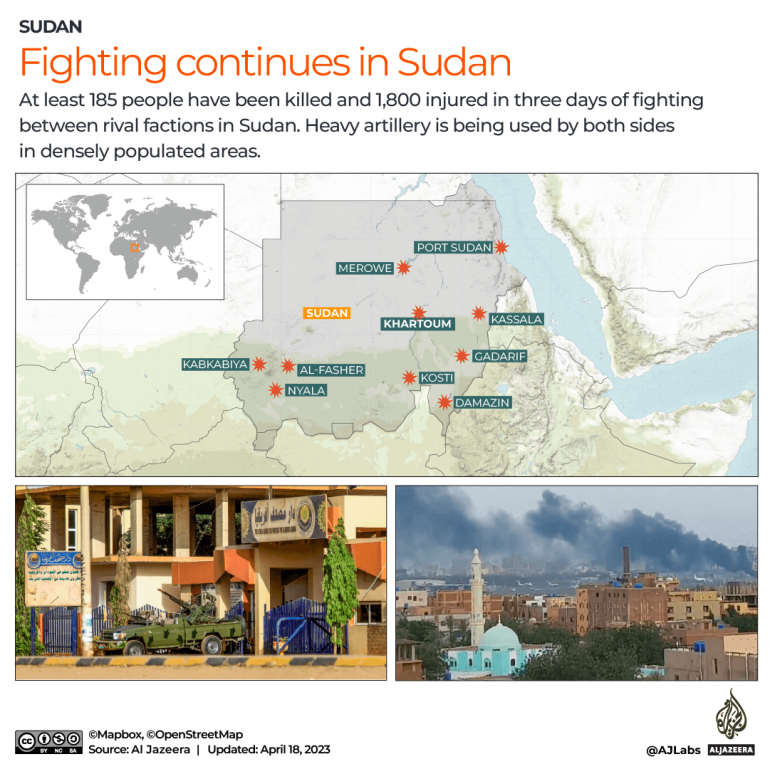Fighting in Sudan between the forces of two rival generals erupted on April 15, killing more than 400 people, igniting a humanitarian catastrophe, and raising fears of a prolonged and unpredictable civil war.
Battles continue to rage in the capital, Khartoum, and elsewhere between troops loyal to army chief Abdel Fattah al-Burhan and Mohamed “Hemedti” Hamdan Daglo, commander of the powerful paramilitary Rapid Support Forces (RSF).
Analysts warn the conflict could draw in foreign armed groups and regional powers, and may have far-reaching consequences, not only for the northeast African country but also for an already unstable region.
A rapid military victory seems unlikely, experts agree, with al-Burhan’s army more powerful, but Hemedti’s RSF excelling in urban warfare. The stage appears set for a lasting conflict.
Fighting spreads
Battles have increased swiftly, engulfing Khartoum and its twin city Omdurman and several other regions, especially Darfur.
“The combat could quickly slide into a sustained war that risks rippling through the country’s restive peripheries into its neighbours,” the International Crisis Group says. “The hostilities have pushed the country toward the full-blown civil war Sudanese have dreaded for years.”
Cameron Hudson – of the Washington-based Center for Strategic and International Studies – says the violence could escalate across Sudan’s borders.
“The challenge is that the conflict … is spread on every corner of the country – on the border with Chad, the Central African Republic, South Sudan and Ethiopia,” Hudson says.

Refugees
Between 10,000 and 20,000 people have fled the fighting to Sudan’s western neighbour Chad, the United Nations says.
Eastern Chad was already hosting 400,000 Sudanese refugees, and the new arrivals are placing an additional strain on the country’s overstretched public services and resources.
Sudan is one the world’s poorest countries and in February the UN said more than one-third of its population is facing a growing hunger crisis.
“Millions of civilians are caught in the crossfire and fast running out of basic necessities,” the International Crisis Group says.
Hudson says he is “fully expecting a massive exodus of civilians” once the first lasting ceasefire takes hold. “I am expecting millions of people to try to cross borders,” he says.
Civil war
If the conflict drags on, more people in the extremely fragmented Sudanese society might take up arms, says analyst Alex de Waal. “There are two protagonists. If the conflict continues, the situation will quickly become more complex.”
Each side is a coalition of several different groups, de Waal says, who may shift their alliances potentially considering “ethnic factors”.
The New York-based Soufan Center warned of “meddling from external states, warlords, armed militias and a range of other violent non-state actors”.
“A failure by commanders to rein in their fighters could further prolong violence,” the think tank said.
Regional powers
Other countries in the region have all officially called for a cessation of violence, but experts agree Egypt backs al-Burhan while the United Arab Emirates backs Hemedti.
Hudson says the two generals were trying to acquire arms and reinforcements from neighbouring countries. Russia’s Wagner mercenary group is also present in Sudan, but its involvement focuses mainly on exploiting the country’s gold reserves.
De Waal warned the fighting could draw in actors who provide funding, weapons “and possibly their own troops or proxies”.
Libya, the Central African Republic, Chad, Ethiopia and Eritrea are likely to play some political or even military roles in the conflict, he adds.
Mediation
“Sudan’s instability is a concern for the entire world, but particularly for neighbouring countries,” says Emirati political scientist Abdulkhaleq Abdulla, noting its strategic position on the Red Sea. “Everyone will pay a price.”
Since tensions erupted, mediators from the United Nations, the African Union, the regional IGAD bloc, and Western and Gulf capitals have been attempting to bring al-Burhan and Hemedti to the negotiating table. So far, efforts have been in vain.
Some analysts say years of diplomacy with the two generals since the overthrow of longtime authoritarian leader Omar al-Bashir in 2019 emboldened them.
The international community and major powers “are getting nothing” when they now call for a ceasefire, Hudson says.

